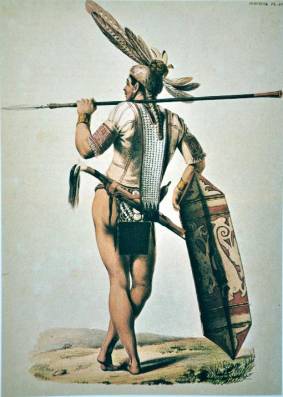Ngaju people
Ngaju people are an indigenous group primarily residing in the Central Kalimantan province of Indonesia, along the vast waterways of the Kahayan, Kapuas, and Barito rivers. They are part of the larger Dayak ethnic group, known for their unique cultural practices, traditional beliefs, and significant contributions to the socio-cultural fabric of Indonesia. The Ngaju are particularly noted for their Hindu-Kaharingan religion, which is a form of Hinduism adapted to local customs and beliefs.
History[edit | edit source]
The history of the Ngaju people is deeply intertwined with the rich tapestry of Borneo's indigenous cultures. Historically, they have been riverine and agricultural people, with a strong reliance on the natural resources provided by their environment. The Ngaju have a complex system of social organization and a rich oral tradition that includes myths, legends, and folktales, which have been passed down through generations.
Culture[edit | edit source]
The culture of the Ngaju is a reflection of their deep respect for nature and their animistic beliefs. They are known for their elaborate ceremonies and rituals, particularly those related to the Tiwah ceremony, which is a secondary funeral ritual aimed at cleansing the soul of the deceased and guiding it to the afterlife. This ceremony is a significant event that involves the entire community and can last for several days.
Language[edit | edit source]
The Ngaju people speak the Ngaju language, which belongs to the Austronesian language family. It is a crucial element of their cultural identity, used in daily communication, traditional rituals, and ceremonies.
Religion[edit | edit source]
The Ngaju practice a unique form of Hinduism known as Hindu-Kaharingan, which incorporates elements of animism, ancestor worship, and the belief in a supreme god along with a pantheon of lesser deities. The religion is officially recognized in Indonesia under the broader category of Hinduism, but it retains distinct characteristics that reflect the local culture and beliefs of the Dayak people.
Economy[edit | edit source]
Traditionally, the Ngaju economy has been based on agriculture, fishing, and hunting. Rice cultivation, particularly the practice of swidden agriculture or slash-and-burn farming, is a staple of their agricultural activities. In recent years, some Ngaju communities have begun engaging in more modern economic activities, including trade and employment in urban areas, while still maintaining their traditional practices.
Social Structure[edit | edit source]
The Ngaju social structure is organized around kinship and community ties. Traditional leadership roles are held by village elders and heads, who play a crucial role in decision-making processes, dispute resolution, and the organization of community events and rituals.
Challenges[edit | edit source]
Like many indigenous groups, the Ngaju people face challenges related to modernization, loss of traditional lands, and environmental degradation. Efforts are being made to preserve their culture and traditions, including the documentation of their language, rituals, and social practices.
Conclusion[edit | edit source]
The Ngaju people are a vital part of Indonesia's cultural mosaic, offering rich traditions, a unique form of Hinduism, and a deep connection to the natural world. Their resilience in the face of modern challenges and their efforts to preserve their heritage are testament to the enduring spirit of the Ngaju community.
This article is a ethnic-group stub. You can help WikiMD by expanding it!
Search WikiMD
Ad.Tired of being Overweight? Try W8MD's NYC physician weight loss.
Semaglutide (Ozempic / Wegovy and Tirzepatide (Mounjaro / Zepbound) available. Call 718 946 5500.
Advertise on WikiMD
|
WikiMD's Wellness Encyclopedia |
| Let Food Be Thy Medicine Medicine Thy Food - Hippocrates |
Translate this page: - East Asian
中文,
日本,
한국어,
South Asian
हिन्दी,
தமிழ்,
తెలుగు,
Urdu,
ಕನ್ನಡ,
Southeast Asian
Indonesian,
Vietnamese,
Thai,
မြန်မာဘာသာ,
বাংলা
European
español,
Deutsch,
français,
Greek,
português do Brasil,
polski,
română,
русский,
Nederlands,
norsk,
svenska,
suomi,
Italian
Middle Eastern & African
عربى,
Turkish,
Persian,
Hebrew,
Afrikaans,
isiZulu,
Kiswahili,
Other
Bulgarian,
Hungarian,
Czech,
Swedish,
മലയാളം,
मराठी,
ਪੰਜਾਬੀ,
ગુજરાતી,
Portuguese,
Ukrainian
Medical Disclaimer: WikiMD is not a substitute for professional medical advice. The information on WikiMD is provided as an information resource only, may be incorrect, outdated or misleading, and is not to be used or relied on for any diagnostic or treatment purposes. Please consult your health care provider before making any healthcare decisions or for guidance about a specific medical condition. WikiMD expressly disclaims responsibility, and shall have no liability, for any damages, loss, injury, or liability whatsoever suffered as a result of your reliance on the information contained in this site. By visiting this site you agree to the foregoing terms and conditions, which may from time to time be changed or supplemented by WikiMD. If you do not agree to the foregoing terms and conditions, you should not enter or use this site. See full disclaimer.
Credits:Most images are courtesy of Wikimedia commons, and templates, categories Wikipedia, licensed under CC BY SA or similar.
Contributors: Prab R. Tumpati, MD


